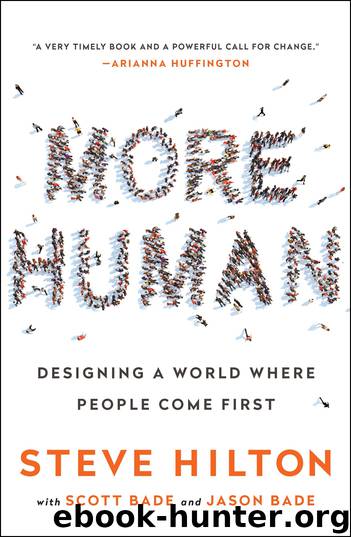More Human by Steve Hilton

Author:Steve Hilton
Language: eng
Format: epub
ISBN: 9781610396530
Publisher: PublicAffairs
Published: 2016-02-28T16:00:00+00:00
THE THIRD CAUSE OF INEQUALITY
Like poverty, inequality has symptoms and causes. An economy-wide skills mismatch is a symptom whose solution is more and better training, but its causes are much deeper, and we’ve already discussed two of them: technology and globalization. There is a third cause of inequality, though, potentially more pervasive than the other two combined. It is structural, often family based, and warrants vigorous attack.
Today’s debate around inequality often focuses on ‘the 1 percent,’ the bankers and CEOs making millions or billions of dollars for often no justifiable reason. Although they certainly contribute to inequality overall, they represent just a small part of the problem. The wider affluent classes—the lawyers, doctors, engineers, and middle-tier executives—also contribute to inequality, but their contribution is less financial than cultural and behavioral. They are entrenching privilege for their children. With all their environmental advantages—from safe neighborhoods to good nutrition to access to tutors, music lessons, extracurricular activities, and travel—the children of the rich are lapping their poorer peers, even when the latter are naturally brighter. As the British economist Leon Feinstein has shown, although students from privileged backgrounds with innate ability maintain their trajectory, similar students from less privileged backgrounds don’t just regress over time; they are eventually overtaken by initially low-achieving but richer peers.32 Affluent children are not succeeding just because of nepotism—although there’s plenty of that around—but their success is undeniably a function of the family and social infrastructure into which they are born, an infrastructure that enables them to be exceptionally well prepared for the challenges of the modern economy. The world remains merit based, but it’s a meritocracy in only a partial sense of the word. Yes, the winners are qualified for their positions, but too many losers fall short not for lack of effort or intellect but because they start so far back that they’re never even competing.
Some of this ‘affluent glass ceiling’ is explicit. Consider professional licenses. Although a doctor or lawyer should obviously be licensed, it is increasingly common for even moderately skilled jobs like childcare or teeth whitening to require a license. In the 1950s only one in twenty workers needed a license in America; now three in ten do.33 Why might this be? Well, as author and commentator Reihan Salam argues, professionals don’t want the competition; dentists want to maintain the exclusive right to clean teeth, so they have erected an artificial barrier to those who wish to do it. As a result, those who might enter slightly higher-skilled fields for better opportunities find themselves facing expensive credential schemes and onerous requirements.34 This has made mobility more difficult while entrenching the privileges of those already occupying these higher-status professions.
Inequality is further ingrained when the affluent marry each other. Their “assortative mating,” as it has been called, results not only in high-earning, two-income families but also in brighter offspring who, by inheriting brainy genes from brainy parents, inevitably do well in the educational rat race themselves (test scores, remember, near perfectly correlate with income).35
As
Download
This site does not store any files on its server. We only index and link to content provided by other sites. Please contact the content providers to delete copyright contents if any and email us, we'll remove relevant links or contents immediately.
Rich Dad Poor Dad by Robert T. Kiyosaki(6632)
Bad Blood by John Carreyrou(6621)
Principles: Life and Work by Ray Dalio(6447)
Playing to Win_ How Strategy Really Works by A.G. Lafley & Roger L. Martin(6304)
Management Strategies for the Cloud Revolution: How Cloud Computing Is Transforming Business and Why You Can't Afford to Be Left Behind by Charles Babcock(4572)
The Confidence Code by Katty Kay(4260)
Thinking in Bets by Annie Duke(4226)
American Kingpin by Nick Bilton(3886)
Delivering Happiness by Tony Hsieh(3425)
Project Animal Farm: An Accidental Journey into the Secret World of Farming and the Truth About Our Food by Sonia Faruqi(3221)
The Power of Habit by Charles Duhigg(3139)
The Tyranny of Metrics by Jerry Z. Muller(3072)
The Marketing Plan Handbook: Develop Big-Picture Marketing Plans for Pennies on the Dollar by Robert W. Bly(3062)
Brotopia by Emily Chang(3054)
Mastering Bitcoin: Programming the Open Blockchain by Andreas M. Antonopoulos(3042)
I Live in the Future & Here's How It Works by Nick Bilton(2997)
The Content Trap by Bharat Anand(2924)
Building a StoryBrand by Donald Miller(2912)
Applied Empathy by Michael Ventura(2904)
